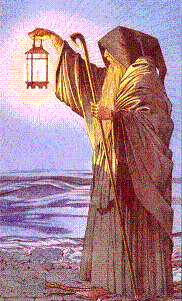Reviews of Tarot Decks
From my large Tarot collection.
Basic Astrology
for Tarot
(the minimum one should know)
Elements/Numerology for Tarot
(basic)

This is advanced material for those familiar with at least a basic knowledge of Tarot. Here, I'm mostly concerned with the development of intuitive insight into the meanings contained in a Tarot reading and the use of the Tarot as a meditative path.
|
Reviews of Tarot Decks
|
Basic Astrology
for Tarot
Elements/Numerology for Tarot
|
|
The Esoteric Hermetic/Cabalistic Attributions
Current research shows that the tarot originated in northern Italy early in the 15th century (ca. 1420). Many believe that it had a much earlier and more mystical source, in any case, the Tarot has evolved into a powerful tool for insight and the development of intuition.
The Tarot of Marseille (fr. mahr/say), which seems to me to be the source of the modern Hermetic rather than the Italian decks, may date as early as 1672. There is a theory that the Tarot may have been imported into Italy from France prior to 1420.
Over the centuries, the Tarot has gathered an ever deepening set of metaphysical/philosophical/psychological attributions from many traditions (this includes Qabalistic, Magicial, astrological, numerological and various occult systems). Tarot provide a profound guide to metaphysical study and a rich framework in which the glyphs/attributions may inspire the awakening of intuitive insight.
I am most interested in the hermetic/esoteric attributions for the Tarot and the use of the Tarot as a tool for experiencing of the wisdom and spirit of the Kabbalah. Pathworking is a powerful method and one of the best ways to become deeply connected with the Tarot.
Silence was the name of John Cage's first book.
Major Arcana (22 Cards; Numbered 0 - 21) represent archetypical energies in life. The Principles, the "Why" behind events.
Minor Arcana (40 Cards; 4 Suites of 10 cards each) represent mundane (though not less import than the Majors) energies in life. The "What" of events.
Court Cards (16 Cards; 4 Suites of 4 cards each) often represent personality traits or specific people in the querent's life; may represent relationships or the environmental energies in life (types of life experiences). The "Who" or "Personal side" of events.
Definitions:
Occult Tarot - decks that have attributed deeper, esoteric meanings to each of the cards. These attributions are usually from magical (magick), hermetic, mythological, religious (especially the ancients; Egyptian, Roman and the Qabalistic) and/or occult philosophical sources.
Querent ("one who queries") is a
person who asks a question an oracle, such as the Tarot, Astrology or the I
Ching.
ALSO:
Western Yoga: for Western minds: merging Western/Hermetic Philosophy with Tantric Yoga
Entering the Angels Way
Return to Tatha Yoga Home Page
Copyright 1997-2012 Tatha Yoga
email: contact@tathayoga.com
Last modified:
December 20, 2012
Updated: May 04, 2014 01:04:05 AM